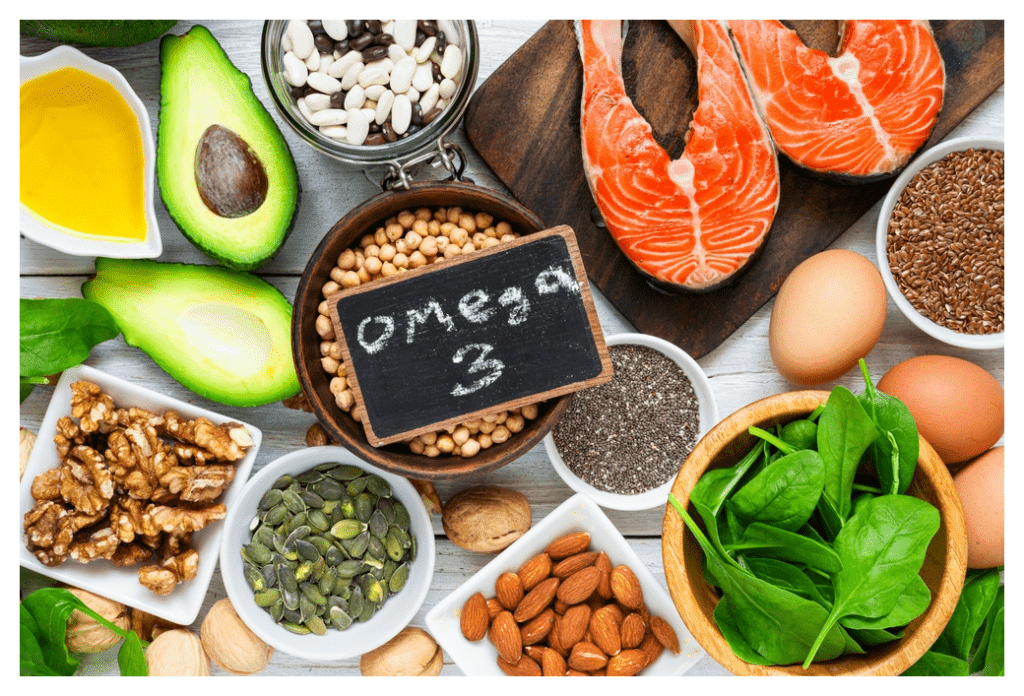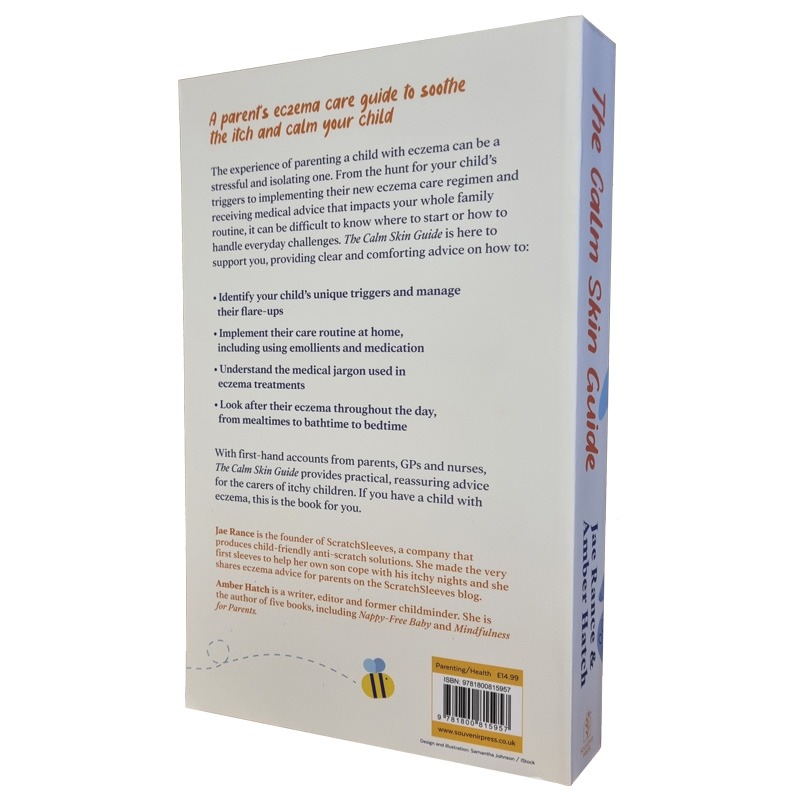

In this article we look at the importance of omega-3 oils in the diet of eczema sufferers and unpick its relationship with eczema and the importance of balancing omega-3 and omega-6. We also discuss the ways in which more omega-3 can be incorporated into your eczema child’s diet.
What is Omega-3?
Omega-3 fatty acids are an essential form of fat that the body can’t produce. They either need to be consumed through food sources or supplements. Omega-3 has multiple functions within the body including reduced risk of cardiovascular disease, reduced risk of blood clotting, lowered levels of triglycerides, and lower levels of inflammation.
There are three types of omega-3 fatty acids:
- ALA (alpha-linolenic acid) is predominantly found in plants and its primary function within the body is to be used as energy. However, it can also be converted into the active form of omega-3 EPA and DPA. Unfortunately, this process isn’t very efficient or effective so only a tiny percentage of omega-3 is converted.
- EPA (eicosapentaenoic acid) is found mainly in fish and algae. EPA has positive health benefits on high blood pressure, high triglycerides, and inflammation.
- DPA (docosahexaenoic acid) is the most important omega-3 fatty acid. It is mainly sourced from fish and algae. Studies have been conducted that concluded the regular consumption of omega-3 sources containing DPA has a positive effect in reducing the severity of eczema symptoms such as inflammation.
Omega-3 and eczema
Itchy, eczema skin is an inflammatory response to something the body believes is an allergen or irritant. Omega-3 fatty acids reduce inflammation by inhibiting the production of inflammatory substances, such as leukotriene B4, which are known to play a role in eczema1. Research shows that eczema sufferers tend to have significantly lower levels of the omega-3 fatty acids, EPA and DHA, in their systems2.
Research into the impact of omega-3 levels on eczema is very limited and studies have not been larger enough to be conclusive3. However, whilst these studies are small, they do suggest that supplementing diets with oils rich in omega-3 fatty acids, including fish oils and flaxseed oil, has the potential to improve skin barrier function4. For example, one study has shown that consuming 1.8g of EPA (one of the omega-3 fatty acids found in fish oil) on a daily basis has caused a significant reduction in symptoms of eczema5.
The balance of Omega-3 and Omega-6
It is important to get the balance of omega-3 and omega-6 right within the body. While omega-3 oils are anti-inflammatory, most omega-6 oils can have the opposite effect. Modern western diets typically include 15 time more omega-6 than omega-3, whereas we evolved eating a diet with around a 1:1 ratio6. This shift is largely due to the reliance on vegetable oils (including margarine) in the western diet. This dietary imbalance increases the likelihood of inflammation and has been linked to increased rates of heart disease and cancer.
There has been little research into the impact of this dietary change on eczema, but researchers in Germany have found that children living in households using butter instead of margarine had a lower risk of developing eczema. They put this difference down to lower levels of omega-6 in butter compared to margarine7. Another indication of the importance of omega is that babies of nursing mothers with elevated levels of omega-6 have a higher risk of developing eczema8.
One way to combat the disproportionate ratio of omega-3 and omega-6 often found in the western diet is to switch from using margarine on a daily basis to using butter as well as reducing the amount of cooking oil used. Switching to using flaxseed oil in salad dressings can also help, but it should not be used in cooking as it has a very low smoking point.
Another way in which the omega-6 to omega-3 ratio can be reduced within the body is by consuming enough vitamins B6, B7, zinc and magnesium. These micronutrients contribute to the breakdown of omega-6. You can find more about which vitamins and minerals can help with eczema management here.
Getting enough Omega-3 in your diet
While supplements are readily available, omega-3 is more effectively absorbed through food sources. The richest sources of readily usable omega-3 (EPA and DHA) are found in fish and so the NHS recommends including two servings of fish per week in your diet, at least one these being an oily fish (the common ones are ‘SMASH’: salmon, mackerel, anchovies, sardines, herring). Salmon and tuna are great, affordable, child friendly sources of omega-3 oils. Try our child-friendly Crispy Salmon Bites recipe.
Non-fishy sources of omega-3 oils (mainly ALA) include eggs, edamame beans (our kids still love eating these out of the pods), chia and linseed seeds (also known as flax seeds) which can be sprinkled, whole or ground, on cereal and walnuts. Seeded bread often contains linseeds. If this all sounds very worthy and healthy, Nigella has a great apple cake recipe that uses walnut oil…
Omega-3 supplements for Eczema
If you do decide to use supplements you will need to read the label carefully. Some fish oil based supplements have levels of vitamin A (also known as retinol) which should be avoided by eczema sufferers as it can both dry the skin and reduce the acidity of the skin. Also check the ingredients for other potential eczema triggers.
Our references
- Thorsen, S., Fogh, K., Broby-Johansen, U., & Søndergaard, J. (1990, August). Leukotriene B4 in atopic dermatitis: Increased skin levels and altered sensitivity of peripheral blood T-cells. Allergy. https://pubmed.ncbi.nlm.nih.gov/2173891/
- Horrobin, D. (2000, January). Essential fatty acid metabolism and its modification in atopic eczema. The American Journal of Clinical Nutrition. https://pubmed.ncbi.nlm.nih.gov/10617999/
- Bath-Hextall, F., Jenkinson, C., Humphreys, R., & Williams, H. (2012, February). Dietary supplements for established atopic eczema. The Cochrane Database of Systematic Reviews. https://pubmed.ncbi.nlm.nih.gov/22336810/
- Parke, M. A., Perez-Sanchez, A., Zamil, D. H., & Katta, R. (2021, January 29). Diet and skin barrier: The role of dietary interventions on skin barrier function. Dermatology Practical & Conceptual. https://www.ncbi.nlm.nih.gov/pmc/articles/PMC7875671/
- Bjørneboe, A., Søyland, E., Bjørneboe, G., Rajka, G., & Drevon, C. (1989). Effect of N-3 fatty acid supplement to patients with atopic dermatitis. Journal of Internal Medicine. Supplement. https://pubmed.ncbi.nlm.nih.gov/2650695/
- Simopoulos, A. (2002, October). The importance of the ratio of omega-6/omega-3 essential fatty acids. Biomedicine & pharmacotherapy https://pubmed.ncbi.nlm.nih.gov/12442909/
- Sausenthaler, S., Kompauer , I., Borte, M., Herbarth, O., Schaaf, B., Berg, A., Zutavern, A., Heinrich, J., & LISA Study Group. (2006, March). Margarine and butter consumption, eczema and allergic sensitization in children. The LISA birth cohort study. Pediatric Allergy and Immunology. https://pubmed.ncbi.nlm.nih.gov/16618357/
- Wright, S., & Bolton, C. (1989, November). Breast milk fatty acids in mothers of children with atopic eczema. The British journal of nutrition. https://pubmed.ncbi.nlm.nih.gov/2557889/
The Calm Skin Guide
Love our blog? It's also available in book format with:
- First hand accounts from parents & medical professionals
- Easy navigation
- Comprehensive index
- Additional material
Signed copies available at no extra cost

Written by:
Reviewed by:
Interesting article? Don't keep it to yourself...
Read next...
You may also find helpful...
Quick buy


Multi Buy Discount

Spend between £30 - £60 and save 5%
Spend between £60 - £120 and save 10%
Spend over £120 and save 15%
Discount automatically applied at checkout
No Quibbles Guarantee

ScratchSleeves abide by a no quibbles guarantee.
Free UK Postage

Free packing and postage on all UK orders. For overseas orders to Europe postage is from £3.50, to USA is £6.50 and to the rest of the world, from £3.75.








